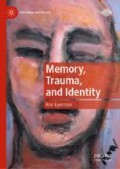Abstract
In the conclusion, Eric Woods reflects on Eyerman’s unique contributions to the development of cultural trauma theory as a research paradigm. In so doing, Woods pays special attention to Eyerman’s position within the burgeoning field, particularly with regard to the spectrum that ranges from “realist” or “naturalistic” interpretations of this phenomenon (Neal) to interpretations that are more “constructivist” (Alexander and Smelser). Eyerman’s middle position is staked out by his claim that cultural trauma cannot be fabricated out of simply any and every occurrence. Rather, it is possible only in the aftermath of events that are so extreme in their degree of violence (e.g., political assassinations, systematic human bondage, mass murder, war) that they naturally lead to massive levels of negative affect throughout a given society. Only in the wake of such catastrophic events can cultural traumas then be constructed.
Access this chapter
Tax calculation will be finalised at checkout
Purchases are for personal use only
Change history
19 June 2019
∎∎∎
References
Alexander, Jeffrey. 2004. Toward a Theory of Cultural Trauma. In Cultural Trauma and Collective Identity, ed. Jeffrey Alexander, Ronald Eyerman, Bernhard Giesen, Neil Smelser, and Piotr Sztompka. Berkeley: University of California Press.
Alexander, Jeffrey, Ronald Eyerman, Bernhard Giesen, Neil Smelser, and Piotr Sztompka (eds.). 2004. Cultural Trauma and Collective Identity. Berkeley: University of California Press.
Eyerman, Ronald. 2008. The Assassination of Theo van Gogh: From Social Drama to Cultural Trauma. Durham, NC: Duke University Press.
Eyerman, Ronald. 2011. The Cultural Sociology of Political Assassination. New York: Palgrave Macmillan.
Eyerman, Ronald. 2012. Cultural Trauma: Emotion and Narration. In The Oxford Handbook of Cultural Sociology, ed. Jeffrey Alexander, Ronald Jacobs, and Philip Smith. New York: Oxford University Press.
Neal, Arthur G. 1998. National Trauma and Collective Memory: Major Events in the American Century. Armonk, NY: M.E. Sharpe.
Author information
Authors and Affiliations
Corresponding author
Rights and permissions
Copyright information
© 2019 The Author(s)
About this chapter
Cite this chapter
Woods, E.T. (2019). Conclusion: Ron Eyerman and the Study of Cultural Trauma. In: Memory, Trauma, and Identity. Cultural Sociology. Palgrave Macmillan, Cham. https://doi.org/10.1007/978-3-030-13507-2_9
Download citation
DOI: https://doi.org/10.1007/978-3-030-13507-2_9
Published:
Publisher Name: Palgrave Macmillan, Cham
Print ISBN: 978-3-030-13506-5
Online ISBN: 978-3-030-13507-2
eBook Packages: Social SciencesSocial Sciences (R0)

